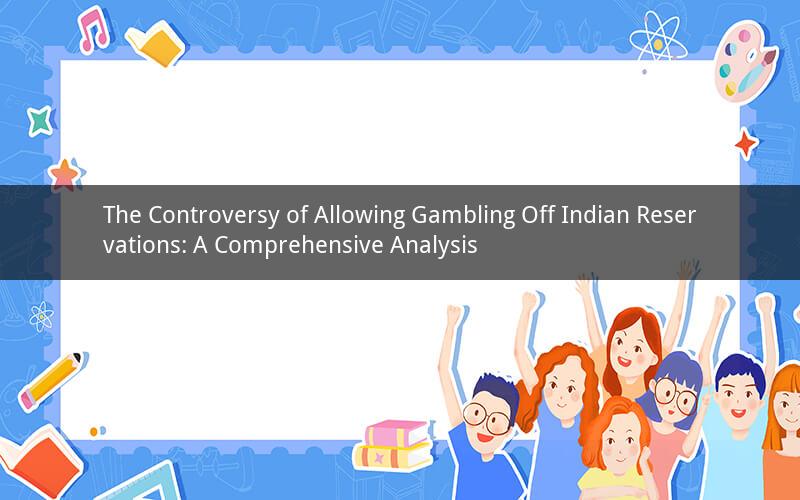
Introduction:
The issue of whether gambling should be allowed off Indian reservations has sparked a heated debate among policymakers, tribal leaders, and the general public. This article delves into the various perspectives surrounding this topic, examining the economic, social, and legal implications of such a decision.
1. Economic Benefits of Off-Reservation Gambling:
One of the primary arguments in favor of allowing gambling off Indian reservations is the potential economic benefits it could bring to tribes and surrounding communities. By expanding their gaming operations, tribes could generate significant revenue, which could be used for infrastructure development, education, and healthcare. Additionally, off-reservation gambling could attract tourists and boost local economies.
1.1 Increased Revenue for Tribes:
Allowing gambling off reservations would provide tribes with a broader market to tap into, potentially increasing their revenue streams. This additional income could be used to fund various initiatives aimed at improving the quality of life for tribal members.
1.2 Economic Impact on Surrounding Communities:
The expansion of gambling facilities off reservations could also have a positive impact on surrounding communities. Increased tourism and economic activity could lead to job creation, improved infrastructure, and a higher standard of living for residents.
2. Social Concerns and Negative Impacts:
Opponents of off-reservation gambling argue that it could lead to various social issues, including increased crime rates, addiction, and strained relationships between tribes and non-tribal communities.
2.1 Crime and Public Safety:
Some critics believe that the expansion of gambling off reservations could lead to an increase in crime rates, as criminal elements may be drawn to the new facilities. This could pose a threat to public safety and create a negative image for the surrounding communities.
2.2 Gambling Addiction:
Another concern is the potential for increased gambling addiction among tribal members and the general public. Critics argue that the easier access to gambling facilities could exacerbate addiction problems, leading to financial and personal hardships.
3. Legal and Sovereignty Issues:
The debate over off-reservation gambling also raises legal and sovereignty concerns. Some argue that allowing gambling off reservations could infringe on tribal sovereignty and the federal government's trust responsibility to tribes.
3.1 Tribal Sovereignty:
Tribal sovereignty is a fundamental principle that allows tribes to govern themselves and manage their own affairs. Critics of off-reservation gambling argue that expanding gaming operations outside of reservations could undermine this principle.
3.2 Federal Trust Responsibility:
The federal government has a trust responsibility to protect and support tribes. Some argue that allowing gambling off reservations could be seen as a violation of this trust, as it may not be in the best interest of tribal members.
4. Balancing Economic and Social Concerns:
Finding a balance between the economic benefits and social concerns associated with off-reservation gambling is a complex task. Some suggest implementing strict regulations and oversight to mitigate potential negative impacts.
4.1 Regulatory Framework:
Establishing a robust regulatory framework could help ensure that off-reservation gambling facilities are operated responsibly and do not contribute to social problems. This could include measures such as age restrictions, responsible gambling programs, and strict enforcement of laws.
4.2 Community Engagement:
Involving local communities in the decision-making process could help address concerns and ensure that the interests of all stakeholders are considered. This could involve public forums, consultations with tribal leaders, and other forms of engagement.
5. Conclusion:
The debate over whether gambling should be allowed off Indian reservations is multifaceted, involving economic, social, and legal considerations. While there are potential economic benefits to tribes and surrounding communities, there are also significant social concerns and legal implications. Finding a balanced approach that addresses these issues is crucial to making an informed decision.
Questions and Answers:
1. What are the potential economic benefits of allowing gambling off Indian reservations?
Answer: The potential economic benefits include increased revenue for tribes, job creation, improved infrastructure, and a boost to local economies through tourism.
2. What are some of the social concerns associated with off-reservation gambling?
Answer: Some social concerns include increased crime rates, public safety issues, and the potential for gambling addiction among tribal members and the general public.
3. How can the negative impacts of off-reservation gambling be mitigated?
Answer: Mitigating negative impacts could involve implementing strict regulations, establishing responsible gambling programs, and engaging with local communities to address their concerns.
4. What is the role of tribal sovereignty in the debate over off-reservation gambling?
Answer: Tribal sovereignty is a fundamental principle that allows tribes to govern themselves. Critics argue that allowing gambling off reservations could undermine this principle.
5. How can a balanced approach be achieved in the debate over off-reservation gambling?
Answer: Achieving a balanced approach involves considering the economic benefits, social concerns, and legal implications. This could be done through a robust regulatory framework, community engagement, and a thorough examination of all stakeholders' interests.